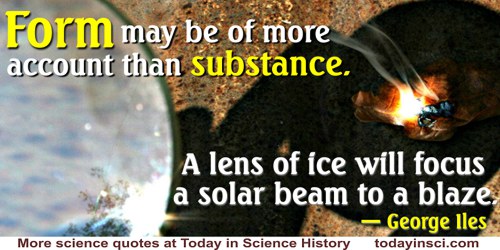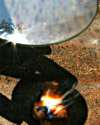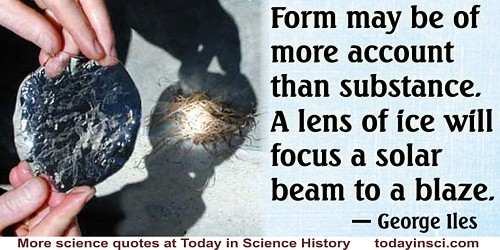Today in Science History - Quickie Quiz
|
|
George Iles
(1852 - 1942)
author and populariser of science who wrote articles for Popular Science Monthly with topics including mathematics, physics and heredity. He also published several books on science and invention, as well as editing a series of short autobiographies, and Canadian Stories. Outside of his written record, it seems little remains known about him.
|
George Iles
“A lens of ice will focus a solar beam”
Illustrated Quote - Medium (500 x 250 px)
“Form may be of more account than substance. A lens of ice will focus a solar beam to a blaze.”
— George Iles
in Canadian Stories (1918)
George Iles added a chapter to his book Canadian Stories called 'Jottings from a Notebook.' It contained a collection of short epithets, most one or two sentences long. A prefatory note says they “have in part appeared in the Century Magazine, New York”. The subject quote was complete in two sentences, so there is no further context on its subject given by George Iles. He did, however, make another comment about fire in Canadian Stories, when he added a footnote, quoting from his earlier book, Flame, Electricity, and the Camera (1900). Iles contrasted the flame-kindling of man millennia ago with electricity as its modern replacement, for example, in the mineral extraction industry to part copper from its compounds by providing intense heat in the core of a crucible:
“A touch and electricity gives us light … in our lamps, glow in our ovens, and in chemistry serve us either as a trowel or a sword. Electricity carries our burdens indoors and out. It impels as readily the monster loom of a cotton-mill as the sewing-machine of a lady at home. … Electricity to-day does all that fire ever did, does it better, and then accomplishes tasks infinitely beyond the scope of fire, however skillfully applied.”
In other brief 'Jottings' he mentioned “Form” in other ways, such as:
“A calculating engine is one of the most intricate forms of mechanism, a telegraph key one of the simplest. But compare their value.”
Iles also used the word form with an interesting metaphor:
“A great book is a mine as well as a mint: it suggests and excites as much thought as it presents in finished form.”
As regards how practical it is to use a lens of ice to make fire, there are several webpages to read, including the well-illustrated Starting Fire With an Ice Lens by Bob Gillis.
Text by Webmaster, with quotations from George Iles
Canadian Stories (1918), 167 & 160-161 footnote, 174, 182.
(source)See also:
- Science Quotes by George Iles.
-
George Iles - context of quote “A lens of ice will focus a solar beam” - Large image (800 x 400 px)
-
George Iles - context of quote “Superstition is a premature explanation” - Medium image (500 x 250 px)
-
George Iles - context of quote “Superstition is a premature explanation” - Large image (800 x 400 px)
Nature bears long with those who wrong her. She is patient under abuse. But when abuse has gone too far, when the time of reckoning finally comes, she is equally slow to be appeased and to turn away her wrath. (1882) --
Nathaniel Egleston, who was writing then about deforestation, but speaks equally well about the danger of climate change today.
 Carl Sagan
Carl Sagan: In science it often happens that scientists say, 'You know that's a really good argument; my position is mistaken,' and then they would actually change their minds and you never hear that old view from them again. They really do it. It doesn't happen as often as it should, because scientists are human and change is sometimes painful. But it happens every day. I cannot recall the last time something like that happened in politics or religion. (1987) ...
(more by Sagan) Albert Einstein: I used to wonder how it comes about that the electron is negative. Negative-positive—these are perfectly symmetric in physics. There is no reason whatever to prefer one to the other. Then why is the electron negative? I thought about this for a long time and at last all I could think was “It won the fight!” ...
(more by Einstein) Richard Feynman: It is the facts that matter, not the proofs. Physics can progress without the proofs, but we can't go on without the facts ... if the facts are right, then the proofs are a matter of playing around with the algebra correctly. ...
(more by Feynman)









